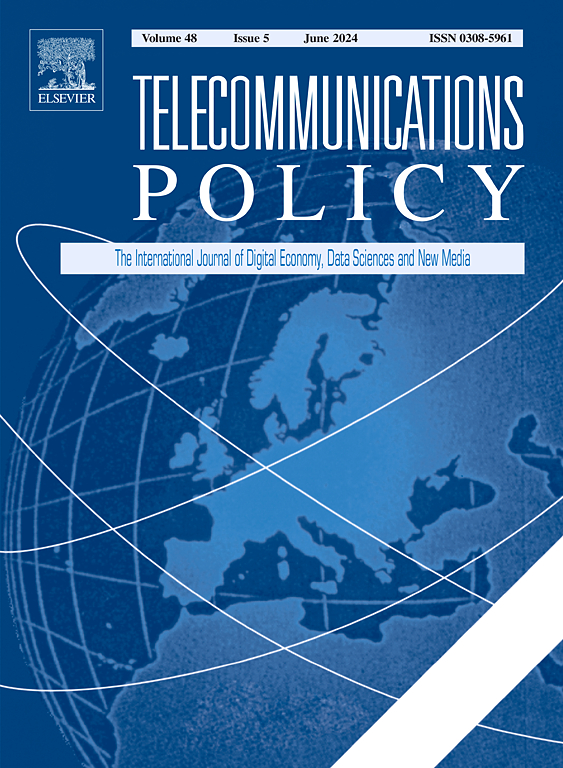Building an ecosystem for mobile broadband measurement: Methods and policy challenges
IF 6.4
2区 管理学
Q1 COMMUNICATION
引用次数: 0
Abstract
Mobile broadband networks constitute essential infrastructure to enable a wide range of innovative services and use cases that will shape the future of the digital economy. As this digital economy evolves, capabilities to collect more fine-grained measurements and generate analytics that deliver insights for real-time network management and localized control are expanding across contexts, technologies, and stakeholders. With broadband value chains becoming increasingly diverse, dynamic, and complex, a robust measurement ecosystem for mobile broadband is necessary to (i) allow service providers to manage and develop their networks, (ii) ensure transparency levels that facilitate informed decisions by end-users and the efficient operation of markets, and (iii) facilitate evidence-based policymaking. As the methods used to collect measurement data are changing, the ecosystem of stakeholders with strategic interests in mobile measurement is growing, posing both new challenges and opportunities for policymakers. This paper explores the evolving measurement requirements and methods and discusses key features of a capable and reliable measurement ecosystem for mobile broadband. We document how the evolving measurement methods are being adopted in several critical broadband policy issues. We find that a healthy measurement ecosystem will need to confront the challenge of reconciling diverse stakeholder perspectives on what measurements should be conducted and how they should be used. Additionally, managing the shared costs of supporting the necessary measurement capabilities and infrastructure represent an additional strategic challenge. Lastly, we explain that governments and telecom regulators have a key role to play as designers, orchestrators disseminators of trustworthy measurement data, and as managers/adjudicators of measurement disputes.
构建移动宽带测量生态系统:方法和政策挑战
移动宽带网络是实现一系列创新服务和用例的必要基础设施,这些服务和用例将塑造数字经济的未来。随着数字经济的发展,收集更细粒度的测量数据和生成分析数据的能力正在跨越环境、技术和利益相关者,为实时网络管理和本地化控制提供见解。随着宽带价值链变得越来越多样化、动态性和复杂性,需要一个强大的移动宽带测量生态系统来(i)允许服务提供商管理和开发其网络,(ii)确保透明度水平,以促进最终用户的知情决策和市场的有效运作,以及(iii)促进基于证据的政策制定。随着用于收集测量数据的方法的变化,在移动测量中具有战略利益的利益相关者生态系统正在增长,这给政策制定者带来了新的挑战和机遇。本文探讨了不断发展的测量需求和方法,并讨论了移动宽带有能力和可靠的测量生态系统的关键特征。我们记录了如何在几个关键的宽带政策问题中采用不断发展的测量方法。我们发现,一个健康的度量生态系统将需要面对这样的挑战,即协调不同的利益相关者对应该进行什么度量以及如何使用度量的观点。此外,管理支持必要的度量能力和基础设施的共享成本是一个额外的战略挑战。最后,我们解释了政府和电信监管机构作为设计者、可信测量数据的协调者和传播者以及测量争议的管理者/裁决者可以发挥关键作用。
本文章由计算机程序翻译,如有差异,请以英文原文为准。
求助全文
约1分钟内获得全文
求助全文
来源期刊

Telecommunications Policy
工程技术-电信学
CiteScore
10.80
自引率
12.50%
发文量
122
审稿时长
38 days
期刊介绍:
Telecommunications Policy is concerned with the impact of digitalization in the economy and society. The journal is multidisciplinary, encompassing conceptual, theoretical and empirical studies, quantitative as well as qualitative. The scope includes policy, regulation, and governance; big data, artificial intelligence and data science; new and traditional sectors encompassing new media and the platform economy; management, entrepreneurship, innovation and use. Contributions may explore these topics at national, regional and international levels, including issues confronting both developed and developing countries. The papers accepted by the journal meet high standards of analytical rigor and policy relevance.
 求助内容:
求助内容: 应助结果提醒方式:
应助结果提醒方式:


